|
|
|
Sort Order |
|
|
|
Items / Page
|
|
|
|
|
|
|
| Srl | Item |
| 1 |
ID:
169336
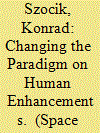

|
|
|
|
|
| Summary/Abstract |
Among the greatest obstacles to the implementation of crewed space missions are human biological limitations. Difficulties were always envisioned in relation to both Earth's moon and Mars but more so for Mars because long spaceflights would also expose crew to prolonged microgravity conditions, in addition to radiation. The result could well be osteoporosis, bone fractures, and disability. In this article, we do not contest the validity of bone loss studies. Rather, we question a seemingly tacit assumption about the immutability of human nature. Indeed, new, invasive, and noninvasive techniques of human enhancement already allow humans to enjoy modifications that will enable lengthy space missions. The alteration of human DNA has not only aided cancer patients but, for example, by using the CRISPR/Cas9 genome editing procedure, can also help to prevent damage to limbs and joints that a prolonged Mars mission could cause for the crew. Possible ethical objections to this solution are discussed, and trade-offs between risks and benefits outlined.
|
|
|
|
|
|
|
|
|
|
|
|
|
|
|
|
| 2 |
ID:
093461


|
|
|
| 3 |
ID:
121072
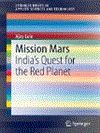

|
|
|
|
|
| Publication |
New Delhi, Springer, 2014.
|
| Description |
xv, 125p.Pbk
|
| Series |
Springer Briefs in Applied Sciences and Technology
|
| Standard Number |
9788132215202
|
|
|
|
|
|
|
|
|
|
|
|
Copies: C:2/I:0,R:0,Q:0
Circulation
| Accession# | Call# | Current Location | Status | Policy | Location |
| 057342 | 523.43/LEL 057342 | Main | On Shelf | General | |
| 057343 | 523.43/LEL 057343 | Main | On Shelf | General | |
|
|
|
|
| 4 |
ID:
169345
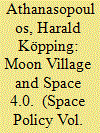

|
|
|
|
|
| Summary/Abstract |
This article discusses the Moon Village concept within the context of the increasing momentum to return human beings to the surface of the Moon. The article follows a dual objective. Firstly, the Moon Village is probably the most misunderstood among the plethora of ideas to explore the Moon scientifically and commercially. The article is therefore intended to explore what the Moon Village actually is. Secondly, the article explores the strengths and weaknesses of the Moon Village. The article is divided into three sections. The first section reviews the current Moon projects of public and private space actors, including the United States, Russia, China, SpaceX and Blue Origin. It sets the scene for the argument that the Moon Village has entered global discourse on space within a positive political environment. The second section discusses the premises of ESA chief Jan Wörner’s Moon Village concept, putting forward that the Moon Village is intended as an open concept rather than as a concrete plan. It is a process rather than a project and it is meant to initiate a global conversation on humanity’s future on the Moon. As such, the world café is an appropriate metaphor to illustrate the idea behind the Moon Village. In the third and final section a SWAT/PEST analysis is conducted to assess the feasibility of the Moon Village, highlighting that one of the major opportunities of the project is to promote international cooperation. The article concludes by supporting the institutionalist hypothesis that the Moon Village is arguably a translation of the ESA system to the global level, as participation is voluntary and as it builds on the strengths of each cooperation partner. As such, the Moon Village in indeed a new way of doing space on the global level.
|
|
|
|
|
|
|
|
|
|
|
|
|
|
|
|
| 5 |
ID:
147519
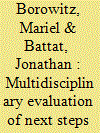

|
|
|
|
|
| Summary/Abstract |
There is a growing consensus among stakeholders around the world that the long-term objective of human space exploration is the long-duration presence of humans on the surface of Mars. However, the key question concerns the choice of near-term missions that will bridge current human spaceflight activities in low Earth orbit (LEO) and eventual Mars exploration. This paper contributes to this debate by identifying the scope of possible near-term missions, arguing that there are only four realistic proposals for initial human exploration beyond low Earth orbit: a cis-lunar habitat, asteroid redirect, Mars flyby, and a short lunar surface sortie. The paper then evaluates these missions across five criteria: 1) technical/economic feasibility, 2) contribution to the eventual goal of exploring Mars, 3) potential for international cooperation, 4) global readiness for the mission, and 5) political feasibility to establish a clear assessment of the pros and cons of each of these four missions. While recognizing that any one of these missions represents a feasible option for future human space exploration, we recommend that the international community pursue development of a cis-lunar habitat as its immediate goal. This mission maximizes development of technology necessary for Mars exploration, provides significant opportunities for meaningful international participation, and could be achieved on a reasonable schedule with current budgets. Both the asteroid redirect mission and lunar exploration plans have the potential to benefit from the development of a cis-lunar habitat and could be retained as intermediate or parallel missions, as resources allow.
|
|
|
|
|
|
|
|
|
|
|
|
|
|
|
|
| 6 |
ID:
121077
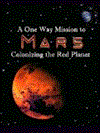

|
|
|
|
|
| Publication |
Cambridge, Cosmology Science Publishers, 2011.
|
| Description |
380p.Hbk
|
| Standard Number |
9780982955246
|
|
|
|
|
|
|
|
|
|
|
|
Copies: C:1/I:0,R:0,Q:0
Circulation
| Accession# | Call# | Current Location | Status | Policy | Location |
| 057344 | 523.43/DAV 057344 | Main | On Shelf | General | |
|
|
|
|
| 7 |
ID:
157163
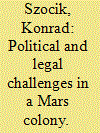

|
|
|
|
|
| Summary/Abstract |
In our essay we are going to briefly discuss some legal and political questions associated with the future colonization of Mars which is now being planned by NASA and the second one is known as Project MarsOne. We assume that it will be unclear as to which legal and political solutions could work in the new Martian ecological niche. Here we will show that this issue requires more attention because we unable to predict which elements of human nature will dominate the lives of the Mars colonizers.
|
|
|
|
|
|
|
|
|
|
|
|
|
|
|
|
| 8 |
ID:
157167
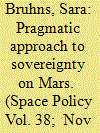

|
|
|
|
|
| Summary/Abstract |
Rising interest in Mars colonization from both private and public sectors necessitates a renewed discussion about sovereignty in space. The non-appropriation principle of the Outer Space Treaty currently prohibits any sovereign claims to celestial bodies, but it remains unclear how this principle should be applied to the peaceful colonization of Mars. Here we develop a pragmatic approach to guide the settlement of Mars, which is based upon a “bounded first possession” model with mandatory planetary parks. Scientists, experts, and leaders will establish planetary park locations and regulations through worldwide community solicitation in order to protect sites of scientific, aesthetic, historical, cultural, environmental, spiritual value. Colonization parties may occupy limited plots of martian land and may claim exclusive economic rights within this zone, while still refraining from any claims to sovereignty. All colonists remain under the legal jurisdiction of their host nation, with conflicts to be resolved diplomatically or through a temporary tribunal system composed of representatives from other Mars colonies. We also propose the formation of a Mars Secretariat as an administrative body with limited power to facilitate communication among parties. Our model for Mars colonization remains consistent with the Outer Space Treaty, but we also recommend revisiting or amending the non-appropriation and province of mankind principles to resolve the ambiguity of how nations, corporations, and individuals may utilize the resources of space.
|
|
|
|
|
|
|
|
|
|
|
|
|
|
|
|
| 9 |
ID:
169347
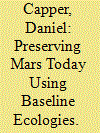

|
|
|
|
|
| Summary/Abstract |
Current calls to protect the Martian environment with “Planetary Parks” maintain environmental merit. However, they lack a sufficiently urgent timeframe for initiating protection and a robust scientific method for the establishment of noteworthy Martian natural landmarks as natural reserves. In response, if we return to the seminal environmental preservation teachings of Aldo Leopold and John Muir, we encounter the importance of grounding Martian preservation efforts on the fundamental environmental science method of a base-datum of normality, or baseline ecology. This method establishes natural reserves that feature both minimal human interference and known origination dates, thereby providing longitudinal environmental control samples for scientific use. Applied before humans appear on Mars, preserved baseline ecologies thereby aid our scientific understanding of human environmental impacts, both now and well into the future, while they enhance a variety of other outcomes in terms of Martian protection. However, the baseline ecology method requires that, through international agreements, we establish these reserves as quickly as possible and certainly before humans arrive on the planet.
|
|
|
|
|
|
|
|
|
|
|
|
|
|
|
|
| 10 |
ID:
178869


|
|
|
|
|
| Summary/Abstract |
In the aftermath of Partition, the Government of India suddenly found itself to be responsible for a large number of refugee women who were not ‘attached’ to male guardians. The national government readily acknowledged the fate of these widowed, abandoned or abducted women as a sphere of feminine expertise and sought the active participation of prominent social workers such as Rameshwari Nehru, Mridula Sarabhai, Ashoka Gupta and Romola Sinha. Referred to as ‘lady social workers’, these women worked as volunteers and advisors to rehabilitate unattached women. Focusing on the voluntary service of social workers in West Bengal, and drawing upon the memoirs and personal papers of Ashoka Gupta, this article seeks to understand the limits and possibilities of this role. Was their role entirely circumscribed by the larger patriarchal vision of rehabilitation that treated ‘unattached’ refugee women as permanent liabilities of the state, or could they author policy that benefitted refugee women? Through a close reading of the solutions, schemes and reforms proposed by lady social workers, this paper suggests a complex relationship that resists such binaries.
|
|
|
|
|
|
|
|
|
|
|
|
|
|
|
|
| 11 |
ID:
109296


|
|
|
| 12 |
ID:
169343
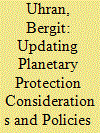

|
|
|
|
|
| Summary/Abstract |
Planetary protection, or the protection of celestial bodies from potentially harmful contamination, has been required by international law since the ratification of the Treaty on Principles Governing the Activities of States in the Exploration and Use of Outer Space in 1967. At that time, scientists were concerned about the potential of contaminating the Moon or bringing back a life form of lunar origin when astronauts returned to Earth with samples. The evidence is that the Moon does not contain indigenous life, but other celestial bodies may. Mars is of particular concern because of its habitability and plans to carry out a robotic sample return mission and even potentially human crewed missions in the near future (next 20–30 years). This article (recognizing that other national and international tasks are ongoing with detailed studies of technical aspects of containment and sample analysis) provides an overview of the policy aspects of planetary protection and sample return, discussing the history of planetary protection, lessons learned from the Apollo missions, and a potential strategy to ensure prevention contamination if a robotic sample return mission is carried out. It is recommended that the capability performed in the 1960s by the Interagency Committee on Back Contamination be reestablished, that regulations be developed to allow quarantine of anyone exposed to the samples, that scientific and technical personnel be trained in a receiving laboratory for at least 2 years prior to sample return, and that a test protocol be established for examining the samples. This will protect our biosphere while enabling groundbreaking research into conditions on Mars and any possible signs of life.
|
|
|
|
|
|
|
|
|
|
|
|
|
|
|
|
| 13 |
ID:
120637
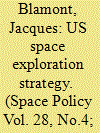

|
|
|
|
|
| Publication |
2012.
|
| Summary/Abstract |
Despite the importance of space to modern life, the public has lost interest in its most human aspect, exploration. This is because spacefaring nations, and especially the USA, have clung on to outmoded cold war ways of thinking about it. The US attitude of 'command' over its international partners will no longer work and we must instead adopt a new, inclusive paradigm in the 'wiki' mould. With different countries leading different facets of a global, cooperative endeavour, and contributions reciprocated in ways valuable to all participants (e.g. through access to know-how or capacity building) there is a real possibility of advancing beyond near-Earth orbit. Keeping the ISS open for the training of future long-duration crews would be the first step in a unified human drive to the Moon, involving first a robotic village and then an international base, with Mars an ultimate goal. It the USA were to reorient its thinking towards such a project it would demonstrate true leadership.
|
|
|
|
|
|
|
|
|
|
|
|
|
|
|
|
| 14 |
ID:
142552
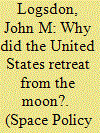

|
|
|
|
|
| Summary/Abstract |
On July 20, 1969, Neil Armstrong and Buzz Aldrin took the first human steps on a celestial body other than Earth. Just over two weeks later, on August 4, NASA presented to a committee charged with making recommendations on the U.S. post-Apollo space program a bold plan of continued lunar and Martian exploration. Over the next six months, that plan was decisively rejected by the administration of President Richard M. Nixon. In 1970, NASA canceled the final two Apollo missions to the Moon, and on January 5, 1972, President Nixon announced approval of the space shuttle program. Focusing the U.S. space program on operating the space shuttle and building a space station has kept the United States human space flight program confined to low Earth orbit for over four decades. There are lessons to be learned from the post-Apollo decisions in the United States for today's attempts to gain political support for a renewed and sustainable program of human exploration of the Moon, Mars, and other solar system destinations. This paper, drawing on in-depth research on the events of the 1969–1972 period in U.S. space policy, will discuss those lessons.
|
|
|
|
|
|
|
|
|
|
|
|
|
|
|
|
|
|
|
|
|